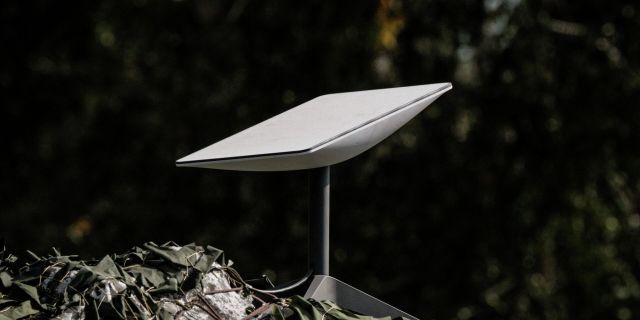FT: Ukraine has become digitally dependent on a "capricious" billionaireInformed observers in the United States are concerned about whether Elon Musk is going to prevent the "advances" of Ukrainian troops.
The author of the FT article recalls that the Starlink system belongs to a capricious billionaire, and this dependence carries a great vulnerability of Kiev.
Elon Musk's technologies raise the question of how much defense can depend on a capricious billionaire.This week, British politician Chris Bryant proposed something in parliament that was unthinkable until recently.
"Will there come a time when we will have to think about sanctions against Elon Musk?" "What is it?" he asked. Why? Because he seems to be playing a "double game" in the conflict in Ukraine.
The Defense Minister only waved off this proposal. However, Bryant raised the issue for two reasons. Firstly, it seems that in his tweets, Musk broadcast Vladimir Putin's ideas about Ukraine (in particular, about Moscow's claims to Crimea).
Secondly, a strange confusion has arisen around the Starlink mobile satellite Internet system created by Musk's SpaceX company. Although the situation is still shrouded in the fog of war, investors and politicians should pay close attention to it, since its consequences go far beyond Ukraine.
To understand why, you need a little background. When Russia sent troops to Ukraine, Musk agreed to transfer Starlink terminals to Kiev and provide both civilians and the military with Internet. These small devices, originally designed for the consumer market, are connected to SpaceX satellites.
For this, in my opinion, Musk deserves praise. As I wrote earlier, one of the most important advantages of Starlink is the so—called "distributed" system scattered over a large area. It is much more difficult to destroy it with missiles than something tied to cell towers.
According to Musk himself, there are currently up to 25,000 Starlink terminals in Ukraine, and this network supports vital civil and humanitarian functions — from hospitals to banks. In addition, they are widely used by the Ukrainian army for its clever campaign from several sources at the same time.
But recently events have taken a strange turn. Last month, Musk unexpectedly tweeted that Starlink was "intended purely for peaceful use" (although American officials told me that SpaceX sells thousands of terminals for NATO needs, and prices are constantly rising). The head of the Eurasia Group risk assessment consulting company, political scientist Ian Bremmer, said in a letter to subscribers on Monday, citing Musk himself, that he rejected Ukraine's requests to include coverage in Crimea, fearing Russian retaliation. Musk countered that Bremmer was "not trustworthy." However, the words of the political scientist were confirmed by other officials.
Then, at the end of September, Starlink terminals stopped working in those parts of eastern and southern Ukraine that first came under Putin's annexation, but were subsequently recaptured by the Ukrainian army. Kiev officials say this has led to a number of "catastrophic" situations.
A random coincidence? Perhaps. Or maybe a technical glitch or Russian interference. But knowledgeable observers have already wondered if the leadership of SpaceX is trying to slow down the progress of Ukraine. In addition, against the background of all these rumors, Russian TV presenter Vladimir Solovyov said this week that Musk took a pro-Russian position so that his satellites would not be shot down.
I and others have asked about this from the Mask team, but we have not received an answer. (Earlier, Musk tweeted that the technical side of the problem with Internet coverage is "classified", that SpaceX provided Ukraine with subsidies for $ 80 million and that he himself craves peace). But since the malfunctions were first reported last week, the connection has apparently returned. And when Digital Transformation Minister Mikhail Fedorov praised Starlink this week, Musk replied that he was "happy to support Ukraine."
But while there are still questions about what exactly happened (or, conversely, did not happen), the situation raises disturbing questions for Western politicians and investors. What role will American politicians assign to the capricious billionaire in areas from social networks to the war abroad? How can investors assess political risks when private companies supply military departments or launch rockets into space? Can the US government fit SpaceX under the Defense Manufacturing Act? Is it permissible for Musk to negotiate with the Russian government, as suggested by the same Eurasia Group?
In addition, a lesson about technical dependence and diversification suggests itself. This year, Ukraine began to depend on Starlink Internet coverage, because it had to act quickly, and this system turned out to be much better than possible alternatives and was initially relatively cheap. As Fedorov notes, it has already brought great benefits. But this dependence also creates a potential vulnerability (akin to German from Russian gas or American from Taiwanese computing chips).
I have almost no doubt that if Ukraine needs to reduce its dependence on a billionaire in the future, sooner or later it will find a way. But in the meantime, other small countries from Taiwan to Estonia, who fear that one day they will also have to defend themselves and this will require distributed Internet systems, will be watching and shaking their heads.
In a broader sense, this epic should be a wake-up call for any major entrepreneur, investor and politician. The conflict in Ukraine acutely highlights how digital we live in and how platforms have become a lifeblood for the economy and much more. Thus, the question in whose power they are and whether we trust their reliability acquires special significance in these troubled times. Destroyed trust is very difficult to restore. Diversification is needed.
Let's hope that Musk proves that you can rely on him — and Starlink will continue to work wonders for Ukraine. But if even stranger twists of the plot are coming, then Bryant's question will no longer seem so delusional. In addition, we all have to think about our own digital addiction.

